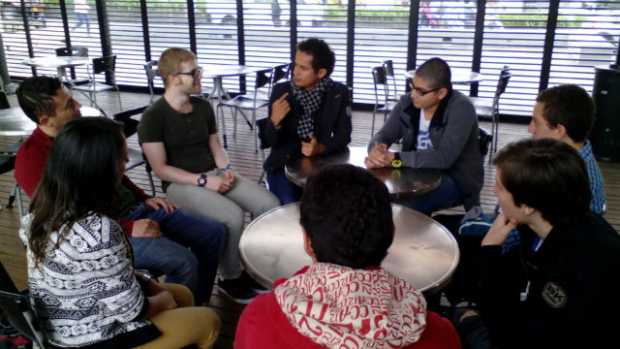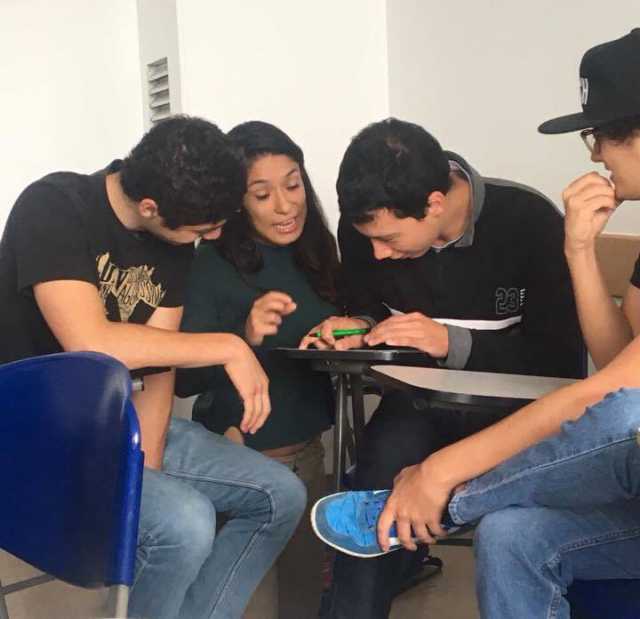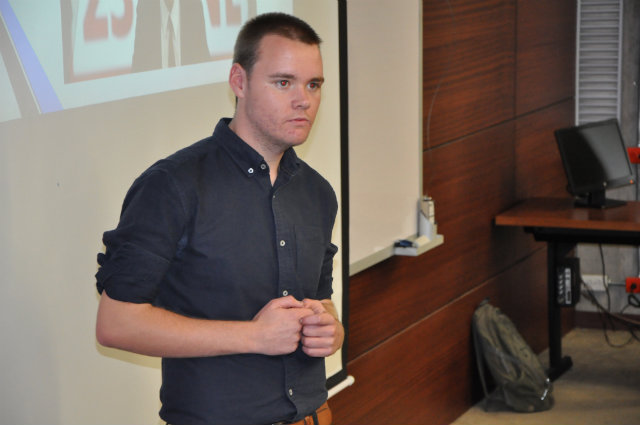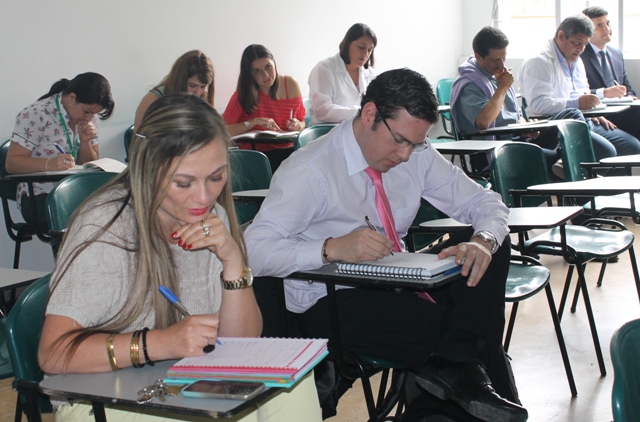
SARA JANE PANCERELLA
LA PATRIA | MANIZALES
It is 8:00 a.m. on Thursday the 26th of October. In a classroom at the Universidad Nacional in Manizales’ Palogrande campus, a passionate conversation about vampires, murders, and zombies is unfolding. It might seem like a strange time to be having a discussion of this nature, especially just as students are getting ready to go to class and talk about academic topics.
However, this is not a conventional class, rather it is an English club led by Maria Guadalupe Vargas. In her classroom, conversations like this are normal, as games and playful activities are incorporated into her strategy for language learning. In fact, these classes become even more interesting when Lupe, as she is called affectionately, utilizes activities that she sees on television programs.
Clubs like this are not unique to the Universidad Nacional as many other universities in Manizales have similar free extracurricular opportunities for students to learn English. In other words, these are opportunities that exist outside of the career curriculums, and those who choose to participate do so voluntarily.
The purpose is for students and members of the community learn the language in a dynamic, entertaining and effective way. This contrasts typical lecture based classes, and instead focuses on conversation rather than grammar. Below are the characteristics of these activities in five universities in Manizales alongside their schedules.
Lea aquí una versión en español de este artículo: https://goo.gl/Eapkpb
Led by Americans

Foto | Sara Jane Pancerella | LA PATRIA
Andrés Salas, director of the Language Center in the Universidad Nacional in Manizales, is convinced that it is important for students to develop an interest in the language during their academic career. “It is vital that our students are able to wield the language well. It is evident that English is a universal language, recognized throughout the world for communication”.
Conversation clubs serve as a strategy to achieve this objective. In this institution, there are four different clubs directed by Fulbright English Teaching Assistants from the United States. In the case of the Universidad Nacional, only students, administrators and professors of the university are invited to attend.
The clubs’ meetings revolve around games and conversation between the Fulbrighters and the participants. “In class, students focus on grammar whereas in the clubs they apply what they have learned, improve themselves and help their peers that are at different levels of language comprehension”, expresses Maria Guadalupe Vargas (foto).
Schedule
-Mondays, from 4:00 p.m. to 5:00 p.m., in the conference room of Museo Samosa
-Mondays, from 5:00 p.m. to 6:00 p.m., in la Nubia block P room 206
-Wednesdays, from 5:00 p.m. to 6:00 p.m., in the Nubia block P room 203
-Thursdays, from 8:00 a.m. to 9:00 a.m., in Palogrande block C room 201
Conferences in English

Photo | Universidad Autónoma | LA PATRIA
In the Universidad Autónoma of Manizales, conversation clubs are not the focus, instead they provide presentations about a diverse range of themes in English. These extracurricular lectures are run by Thomas Lock, a student from England who works to strengthen the teaching of English at the university, thanks to a grant from the British Council.
Like the Universidad Nacional, these activities are only available for the academic community of this university. Tom, as most people call him, focuses his time preparing for Tom Talks and 30 Minute English expositions about topics ranging from music and cultural traditions in England to politics and the economy.
“The intention is to allow them to get to know a different aspect of the world, a different culture. Additionally, these activities aim to show that when someone is learning English, it is not just to be able to talk, but it is to be able to understand a part of the world that is distinct. Outside of grammar and exams, there exists a practical purpose for learning the language”, explains Tom.
During these presentations, the British student compares British culture and Colombian culture. He adds that these forums not only strengthen fluidity, but they also present English in a different way and the attendees can also share their impressions during a discussion at the end of the meeting.
Schedule
-Tom Talks; Once a month. Consult www.autonoma.edu.co to learn more about the next conferences.
-30 Minute English: Tuesdays and Thursdays, from 6:00 p.m. to 6:30 p.m., room 3-101. Fridays, from 8:00 a.m. to 9:00 a.m., room 13-104.
Hidden curriculum

Photo | Universidad de Manizales | LA PATRIA
Reading clubs that discuss the works of authors like Edgar Allan Poe, conversation clubs, immersion experiences at farms, disciplinary discussions (discussion groups about specific themes like psychology), among others. These are the extracurricular activities offered by Universidad de Manizales.
These opportunities are only for the university community. In order to attend, one must have a B1 level of English, as these activities are directed at individuals who already have a foundation in the language. Diego Vallejo, director of the Department of Languages at Universidad de Manizales, further explains: “This offer is part of a hidden curriculum that is free and optional. We provide it as an opportunity. The idea is to maintain and raise the participant’s English level”.
How to participate
As one must have a B1 level of English to participate, reach out to the Language Department of Universidad de Manizales for more information.
Free and in cafes

Photo | Universidad Católica | LA PATRIA
The Universidad Católica of Manizales has a club called Pow-Wow, a term derived from the indigenous people of North America. “It expresses a way to socialize without stress”, explains Matías Marín, coordinator of the Language Center at Universidad Católica.
The difference between this club and other university activities is that it is free and open to the general public, regardless of whether or not they are part of the University community. Marín describes the themes that are addressed during the meetings: “It is not exclusively cultural, nor is it exclusively social. The dynamics of the conversation emerge from the interests of the participants”.
He mentions that a specific English level is not required to attend. “One only needs to have the motivation”, he adds. Another interesting element of this club’s meetings is that instead of taking place in a classroom at the Universidad Católica, they meet in different cafes around the El Cable sector.
Schedules
-Tuesdays, from 5:00 p.m. to 7:00 p.m. As the meeting place for this club changes every week, Marín advises those interested to fill out the form available on: https://goo.gl/ZkFP9M. After completing the form, they will contact you with the following steps to take.
For graduate students and professors
Universidad de Caldas has five free conversation clubs directed towards graduate students, professors and researchers at the University. The requirement to participate is to have a B1 level of English. Liliana del Pilar Gallego, director of the Foreign Languages Department, indicates that in the future they hope to strengthen the teaching of languages with Fulbright Scholars who travel from the United States and stay in the country to teach the language.
Schedule
-Tuesdays and Thursdays, room U205 at the central campus, from 6:30 p.m. to 8:30 p.m.
-Mondays and Wednesdays, room C202 at the central campus, from 6:30 p.m. to 8:30 p.m.
-Mondays and Wednesdays, room U204 at the central campus, from 6:30 p.m. a 8:30 p.m.
How do you create a club?
Maria Guadalupe Vargas, Fulbright English Teaching Assistant and instructor of an English club at the Universidad Nacional in Manizales, gives recommendations to start an English conversation club:
Creation
1. Establish what you want from your club. It is important to determine whether it will be based in the university or amongst friends
2. Choose the type of English that you want to learn: complexity and themes. As well as culture, vocabulary and grammar.
3. Give it a structure. Decide if you are doing it to help with your thesis or if it is just to talk to new friends. By clearly defining these aspects, the participants can have an idea of what the expectations will be for the club.
Teaching
4. Start with activities that are easy and gradually increase the difficulty.
6. Instill confidence in the students so as to overcome their timidity in speaking. A good strategy is to ask them questions about issues that they know and that elicit a simple response. This raises the students’ interest and avoids the pressure for correct answers.
7. For example, a tactic that I employ is to incorporate activities used by comedians on their talk shows like the funny games from The Tonight Show Starring Jimmy Fallon. This helps to make the participants feel more comfortable and excited to participate.
They are in a club
El uso de este sitio web implica la aceptación de los Términos y Condiciones y Políticas de privacidad de LA PATRIA S.A.
Todos los Derechos Reservados D.R.A. Prohibida su reproducción total o parcial, así como su traducción a cualquier idioma sin la autorización escrita de su titular. Reproduction in whole or in part, or translation without written permission is prohibited. All rights reserved 2015